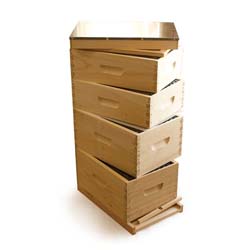In this edition of Beekeeper Stories, we highlight a long-time Colony member and beekeeper, Kelle! Kelle has been an awesome member of our Colony community and is always asking the most wonderful questions, in both our Colony Cluster events and on the Colony Forum. She’s also always willing to share what she’s learned with other members, and we so appreciate her input.
So we asked Kelle if she would share how she reached this point in her beekeeping passion. Here is her beekeeping story.
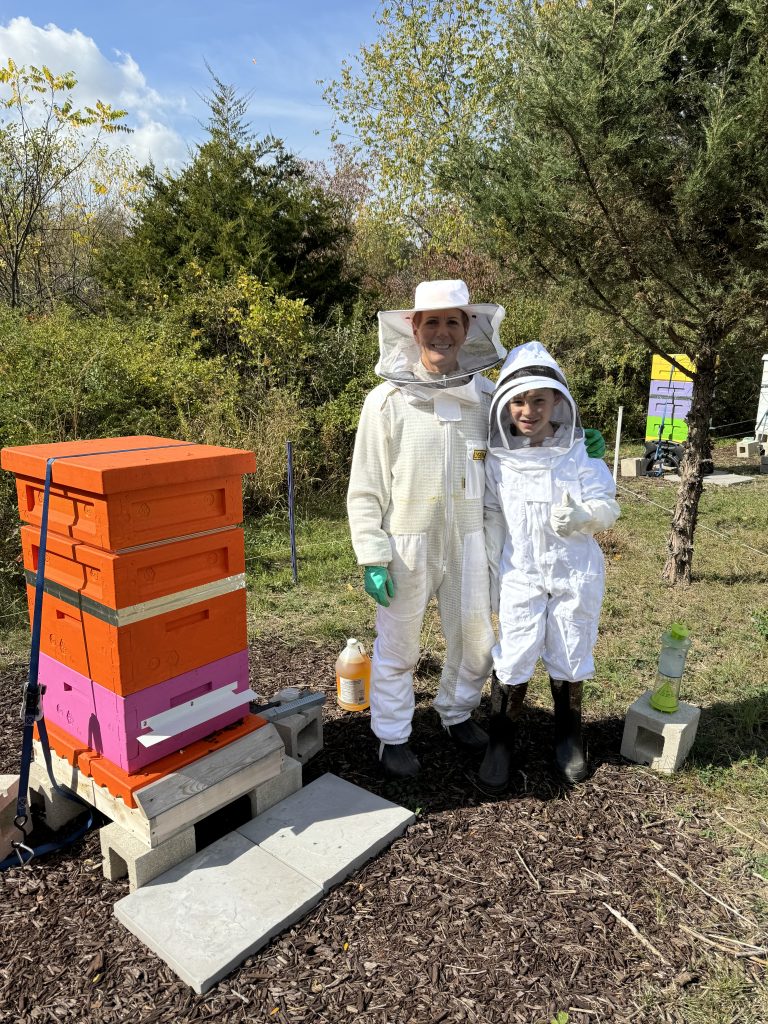
Kelle tends to her honeybee colonies in Hennepin, IL (around 2 hrs. west of Chicago) and has been at it for 5 years now! She started out with 2 hives but has increased her bee yard through the years and now has 5 colonies.
Kelle loves sharing what she’s learned about her beekeeping with family, friends, and anyone who wants to listen to her talk about bees! Her friends always ask, “How are your bees doing?” and her husband helps out in the bee yard sometimes, too, and is super supportive of her hobby.
For this reason, Kelle is glad to be a part of our Colony community. As is the case with many of our members, she has also joined her local beekeeping club, the Illinois Valley Beekeepers Association. She loves hearing the thoughts and opinions of other beekeepers and has learned a lot and made some great connections through the club.
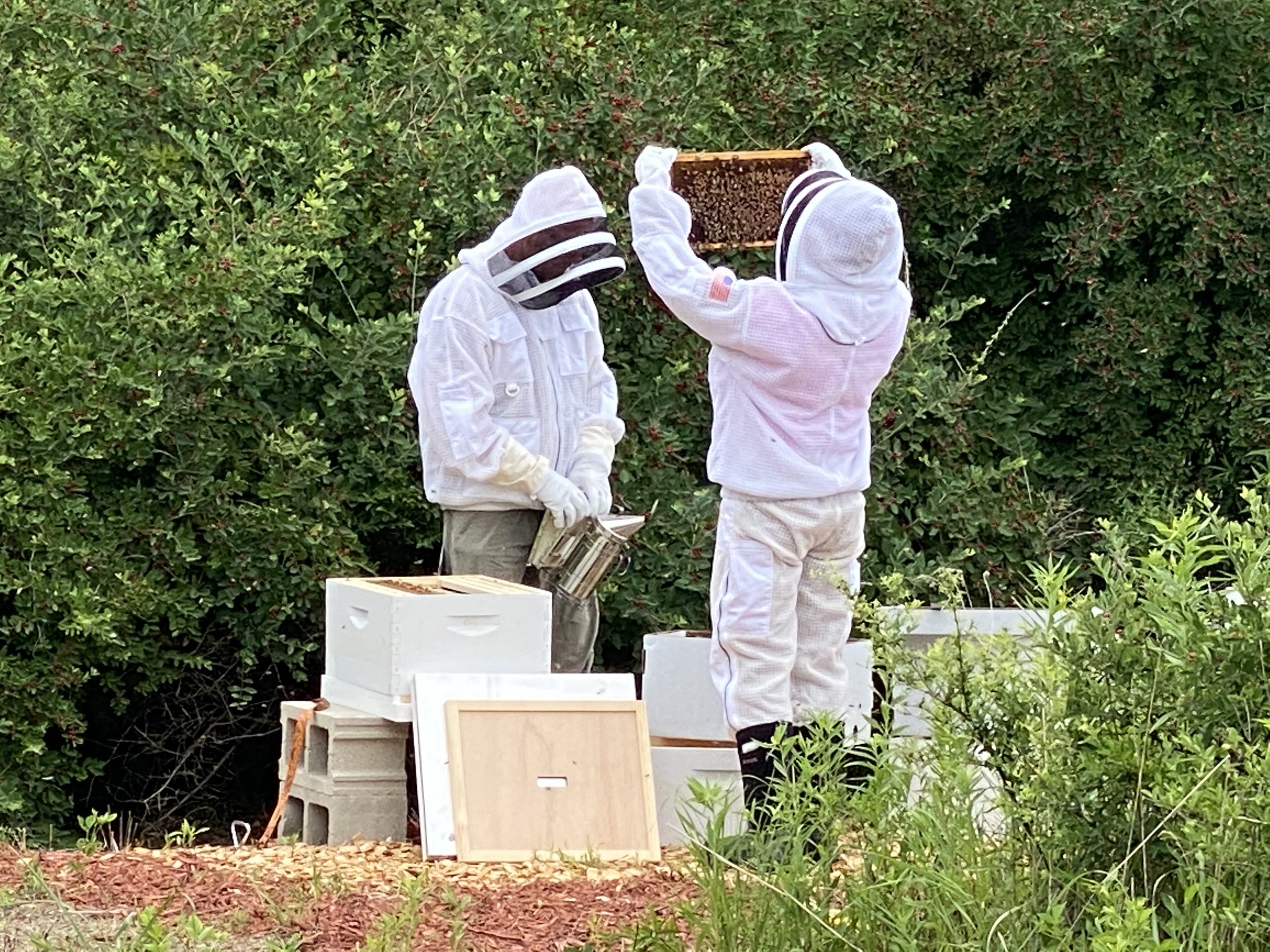
We asked Kelle some questions to learn the reasons she feels so passionate about beekeeping… read on to find out!
Q: What are your main objectives and goals with beekeeping?
My main objectives/goals are to learn and grow in my knowledge of bees. I just love them and I am fascinated by them. The honey is great, but I don’t worry about that as much as I worry that I’m taking good care of the bees.
Q: What do you enjoy most about beekeeping?
I mostly enjoy just watching them at the entrance and around my yard. I have always been fascinated by bugs and insects. I am constantly taking pictures around my yard of all kinds of insects and birds. They have also taught me a lot about life in general – that I’m not in control of as much as I think I am! Also, I have grown in my ability to problem-solve and think things through.
Q: Other than the important lessons mentioned above, can you share a moment where the bees taught you something meaningful?
The bees have taught me about resiliency. With one hive, I know they got into something poisonous. Bees were shaking and dying like crazy. I thought I was going to lose them, but they fought back! I still have that colony.
They have also taught me that not everything that happens is my fault. Sometimes, things just happen. I can do what I can, but the rest is up to them. They have helped me not to worry so much about them, and also about life in general. They have given me a powerful connection to earth and nature. They were here long before us. It’s amazing!
Q: What is your biggest concern or worry about your bees or beekeeping?
My biggest concern or worry is diseases and pests. I hope over time that the bees will evolve to handle varroa, but until then, they are a serious problem. It tends to take some of the enjoyment out of beekeeping, always worrying about the mites.
Q: What’s your biggest ongoing challenge as a beekeeper, and how do you handle it?
I think my biggest challenge is worrying (even though I’m better at it!) and the mites!!! I hate doing mite checks and treatments. But I know it’s helping them and that’s something important I can do for them. So, I make myself do it, knowing it’s what is best for their health.
Q: Do you have any tips or recommendations that you would pass on to other beekeepers that are perhaps not widely practiced or understood?
I have unique overwintering practices, but one thing I do is leave them an entire extra super of honey. I go to Florida for the winter, and that seems to have helped to get them through. I have never lost a hive. I do come back to check them once at the end of February. Then I come back for the summer, at the end of April.
Q: How do you manage your hives while wintering in Florida, and what makes your overwintering approach successful?
For winter, before I leave for Florida, I always do two Oxalic acid vaporization treatments. I also make candy boards. Each hive is wrapped, entrances are reduced, and bottom boards are closed off. Each hive has an extra full super of honey.
Then I put an empty super on top, put 10 pounds of winter patties and four Hive Alive Fondant packages inside, and a candy board on top. And I use the BeeSmart Ultimate hive cover with the insulated inner cover, and that’s it!
It has worked like a charm for 5 years!
Usually, when I go back to check on them at the end of February, I give them one or two Hive Alive packages, just in case they need a little extra to make it until trees start blooming. My hives are very protected from the wind, too. They have a block of bushes and trees on the prevailing north wind side.
This approach has worked for me! Sometimes I think I should do something different and then I think “Why? It’s working”!
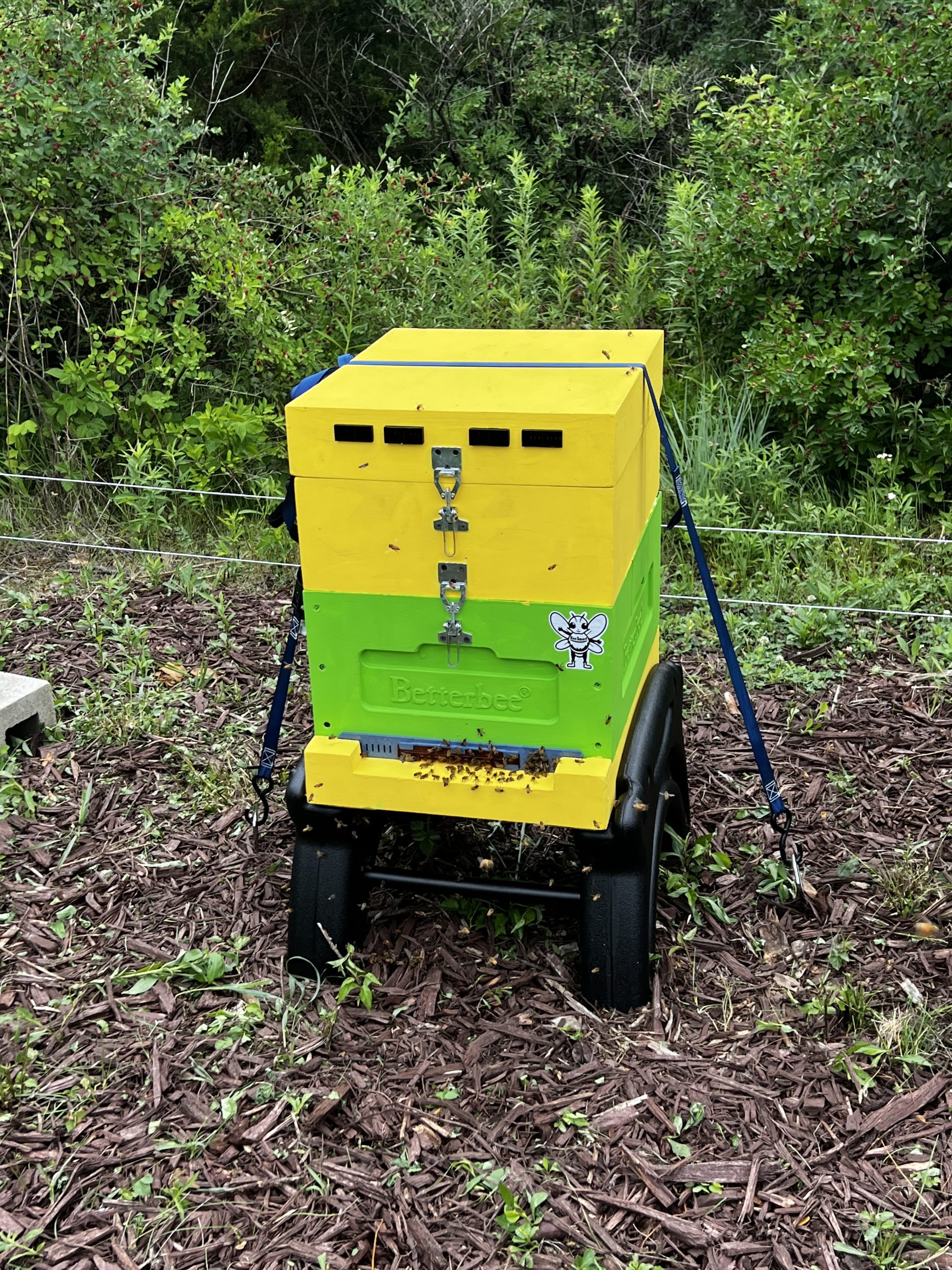
Q: What is your biggest surprise in beekeeping?
I was surprised that beekeeping is a lot more work than I thought, but in a good way. I thought they would just be in the hive and maybe I would check them once in a while. I have enjoyed being more involved than I thought I would be, such as making sure they have water, adding electric fencing for protection against pests and checking for signs of skunks/racoons, etc.
Q: What were those early days like with your first two hives? Any memorable surprises or challenges?
The early days were great and hard. I literally thought that all the things that can happen were not going to happen to me! I really didn’t have any big issues – just learning to do mite tests, deciding about treatments and dealing with small hive beetles. And it was difficult, that first year, trying to decide what to do when I went to Florida at Thanksgiving for the winter months.
Honestly, I cried a lot – I thought that everything that would “go wrong” was my fault. Even though I mentioned not liking to test and treat for mites, I am diligent about it. I make sure in the fall that my mite counts are low, treat if necessary, and then do that OA vapor before I leave, as a little extra insurance!
(Learn more about creating an integrated pest management plan of your own here!)
Q: What about the bees themselves, is there anything surprising that you’ve noticed about them?
I was really surprised to learn that each hive has a different “personality”. I would think insects all just act the same. But not bees!
I have a really mean hive that has been that way for 5 years and has been through several queens. So who knows! They are amazing honey producers and have survived through some times when I thought they were done. They also have guards who will follow me back to the house!
But then my other colonies are so calm, I can walk right up to the front of the hive, and they don’t care.
Q: Can you tell us about one of your most memorable beekeeping stories or lessons learned?
My first year of beekeeping, I picked up my nucs (two of them) and installed them. I was so happy and proud of myself. I went out to look at them a couple of hours later and there was a queen walking around on the ground! I put her in the hive from which I thought she came (without looking!). I was wrong, so she was unfortunately killed.
So, that was my first time learning about mistakes the hard way! I had to get a new queen, but I learned a lot from that one incident. The people I buy my bees from tell that story to clients all the time, because they want people to know that we only learn from our mistakes.
Q: How has the Illinois Valley Beekeepers Association influenced your journey?
IVBA has been awesome! When I was new, one of the members drove 45 minutes after work to help me inspect my hives!
I’ve also gone along with beekeepers to watch them do inspections and learn what they do. It’s been a great support system for questions and answers. Being in a community of people who have the same passion feels so good!
Q: What does starting the Master Beekeeping Program at Cornell mean to you personally?
Starting Cornell’s Master Beekeeper program is a huge challenge for me. I never went to college, so the bees have led me to pursue this. I was terrified when I started the first class, and I didn’t think I could do it. It’s hard!
But I’m learning to use my brain to study and do research! I pushed through and I passed the first section! This has really given me so much confidence and belief in myself.
Q: What would you consider to be a unique aspect of your beekeeping hobby?
I simply got interested in beekeeping when I went to a beekeeper’s yard while visiting Tucson, AZ. I was awestruck and just knew this was what I wanted to do! That was 5 years before I actually got my first bees. I immediately started taking classes and learning as much as I could.
Now, 10 years later, I just started the Master Beekeeping Program at Cornell University! I never went to college, so beekeeping has led me on a journey to keep learning and growing!
Q: What was it about that visit to the beekeeper’s yard in Tucson that made you want to start beekeeping?
There was something that just clicked. It was like a lightbulb went off – I love this and I have to do it! It probably helped that the beekeeper was a great guy who was passionate about bees. The smell of the hive, the bees on the frame, the pollen color. I was mesmerized.
After I saw the beekeeper in Tucson, my dog sitter started keeping bees and I would go see their bees, too, during the time I was taking classes and learning. She was also an inspiration and I became so comfortable around bees because of her!
Q: What was the five-year period like between discovering beekeeping and getting your first bees?
I took tons of classes and read tons of books. It finally got to a point where I knew it was time to get bees. I had read and learned all I could but now I needed the experience.
Q: How has your day-to-day involvement changed as you’ve grown from two hives to five?
My day-to-day involvement isn’t too different with more hives. Obviously, inspections take more time. I am still constantly walking out and looking at them. I even put umbrellas up in the summer on days when it’s super hot to help them with some shade and to stay cool.
I have tons of carved stones around the yard that are bird baths. But the bees have taken them over, so I’m always filling those up. I live on a prairie and also have a huge preserve near me, so their foraging options are amazing.
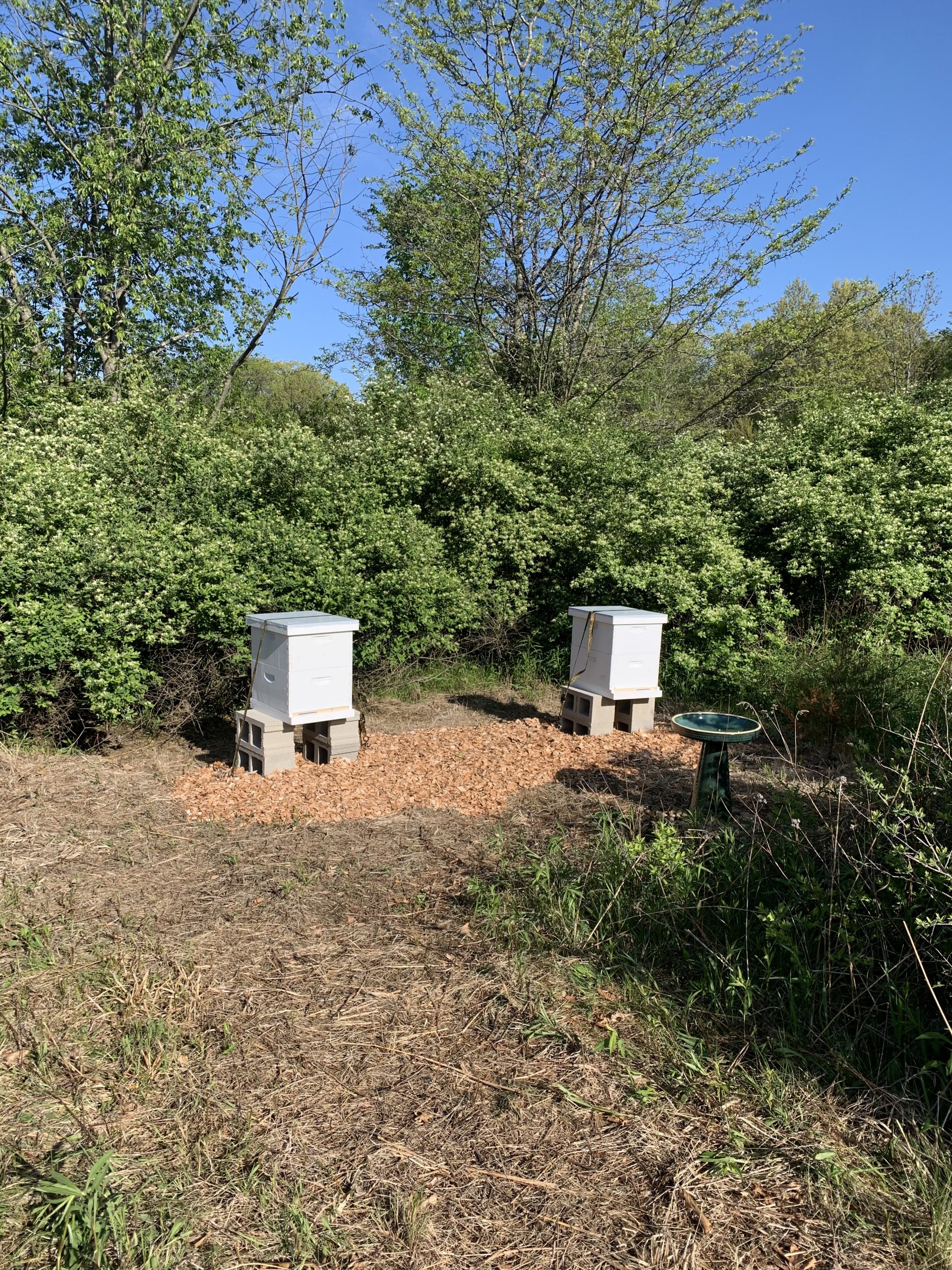
Q: And last but certainly not least, what advice would you give to someone just starting out in beekeeping?
Don’t give up! Stuff happens. Keep working at it, keep learning, keep being curious. Beekeeping can be frustrating, hard, hot and tiring… But it is so rewarding, and you get to work with bees and learn about their amazing life and world!
And keep in mind, the learning never ends! I feel like they give me more than I give them. Honestly, just to have the honor to help take care of them – it’s a gift.
